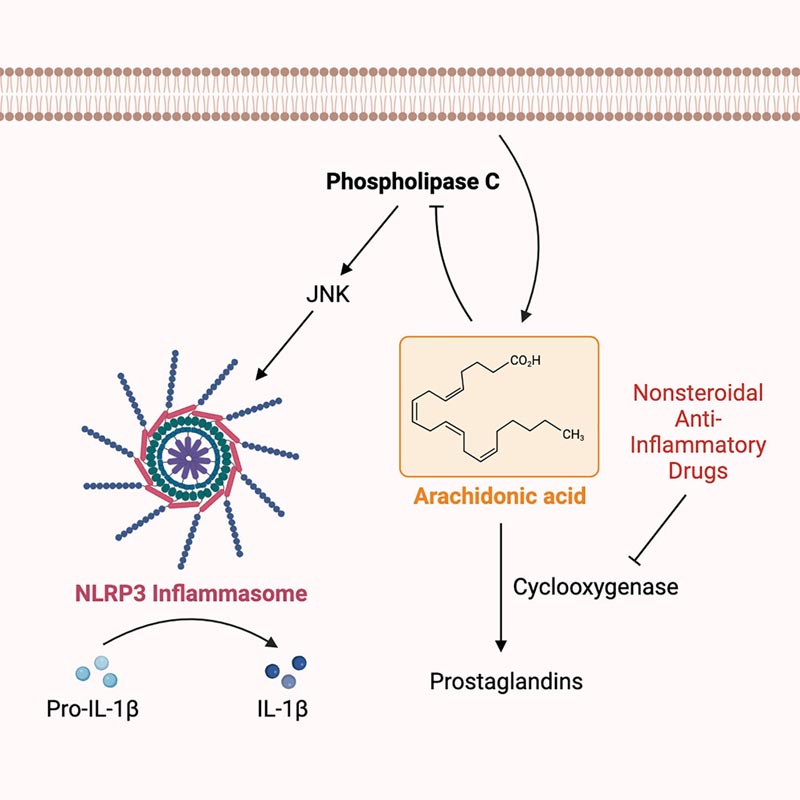University of Cambridge
Cambridge scientists may have discovered a new way in which fasting helps reduce inflammation, a potentially harmful side effect of the body’s immune system that underlies a number of chronic diseases.
Highlights
|
Summary
Elevated interleukin (IL)-1β levels, NLRP3 inflammasome activity, and systemic inflammation are hallmarks of chronic metabolic inflammatory syndromes, but the mechanistic basis for this is unclear. Here, we show that plasma levels of IL-1β are lower in fasting compared to fed subjects, while the lipid arachidonic acid (AA) is elevated. Lipid profile of NLRP3-stimulated mouse macrophages shows increased AA production and an NLRP3-dependent eicosanoid signature. Inhibition of cyclooxygenase by nonsteroidal anti-inflammatory drugs decreases the production of eicosanoids, but not AA. It also reduces the production of IL-1β and IL-18 in response to NLRP3 activation. AA inhibits NLRP3 inflammasome activity in human and mouse macrophages. Mechanistically, AA inhibits phospholipase C activity to reduce JNK1 stimulation and thus NLRP3 activity. These data show that AA is an important physiological regulator of the NLRP3 inflammasome and explains why fasting reduces systemic inflammation and also suggests a mechanism to explain how non-steroidal anti-inflammatory drugs work.

Comments
In research published in Cell Reports , the team describes how fasting increases blood levels of arachidonic acid , which inhibits inflammation. Researchers say it may also help explain some of the beneficial effects of medications like aspirin.
Scientists have known for some time that our diet, particularly a high-calorie Western diet, can increase our risk of diseases such as obesity, type 2 diabetes and heart disease, which are linked to chronic inflammation in the body.
Inflammation is our body’s natural response to injury or infection, but this process can be triggered by other mechanisms, including the so-called "inflammasome" , which acts as an alarm within the cells of our body, activating inflammation to help to protect our body when it feels damage. But the inflammasome can unintentionally trigger inflammation: one of its functions is to destroy unwanted cells, which can lead to the release of cell contents into the body, where they trigger inflammation.
Professor Clare Bryant from the Department of Medicine at the University of Cambridge said: "We are very interested in trying to understand the causes of chronic inflammation in the context of many human diseases and, in particular, the role of the inflammasome .
"What has become evident in recent years is that one inflammasome in particular, the NLRP3 inflammasome, is very important in a number of important diseases such as obesity and atherosclerosis, but also in diseases such as Alzheimer’s and Parkinson’s, many of the diseases of old age, particularly in the Western world.
Fasting may help reduce inflammation, but the reason is unclear. To help answer this question, a team led by Professor Bryant and colleagues from the University of Cambridge and the US National Institutes of Health studied blood samples from a group of 21 volunteers, who ate a meal of 500 kcal and then fasted for 24 hours before consuming a second 500-kcal meal.
The team found that restricting calorie intake increased levels of a lipid known as arachidonic acid . Lipids are molecules that perform important functions in our body, such as storing energy and transmitting information between cells. As soon as people ate again, arachidonic acid levels decreased.
When researchers studied the effect of arachidonic acid on immune cells grown in the lab, they found that it reduces the activity of the NLRP3 inflammasome . This surprised the team, as arachidonic acid was previously thought to be linked to an increase in inflammation levels, not a decrease.
Professor Bryant, a fellow at Queens’ College, Cambridge, added: "This provides a potential explanation for how changing our diet - particularly through fasting - protects us from inflammation , especially the harmful form that underpins many diet-related diseases. high-calorie western food.
"It is too early to say whether fasting protects against diseases such as Alzheimer’s and Parkinson’s, as the effects of arachidonic acid are short-lived, but our work adds to a growing body of scientific literature pointing to health benefits." "It suggests that regular fasting over a long period of time could help reduce the chronic inflammation we associate with these conditions. It’s certainly an attractive idea."
The findings also point to a mechanism by which a high-calorie diet could increase the risk of these diseases. Studies have shown that some patients who eat a high-fat diet have higher levels of inflammasome activity.
"There could be a yin and yang effect , whereby too much of the wrong diet increases inflammatory activity and too little decreases it," Professor Bryant said. "Arachidonic acid could be one way this is happening."
Researchers say the discovery may also offer clues to an unexpected way in which so-called nonsteroidal anti-inflammatory drugs, such as aspirin, work . Normally, arachidonic acid is broken down quickly in the body, but aspirin stops this process, which can lead to increased levels of arachidonic acid, which in turn reduces inflammasome activity and therefore inflammation.
Professor Bryant said: "It is important to emphasize that aspirin should not be taken to reduce the risk of long-term illness without medical guidance, as it can have side effects such as stomach bleeding if taken over a long period of time."
The research was funded by Wellcome, the Medical Research Council and the Intramural Research Division of the US National Heart, Lung and Blood Institute.
















